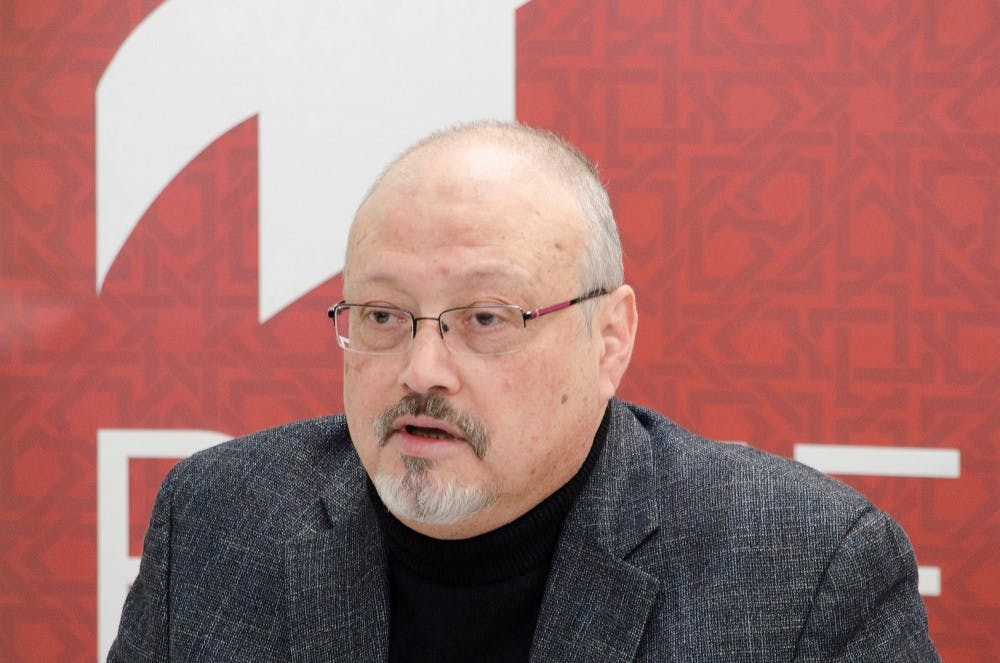By Nabih Bulos
Los Angeles Times
BEIRUT — Far from being a wake-up call, the gruesome murder of journalist Jamal Khashoggi just over a year ago appears to have instilled a negative lesson — that stifling dissent, even in a lurid fashion, can have limited consequences.
Since Khashoggi was choked and dismembered by Saudi agents in the Saudi Arabian Consulate in Istanbul, murders, imprisonment, hostage-taking and enforced disappearances of journalists have increased worldwide, according to Reporters Without Borders. A total of 80 journalists were killed in 2018, another 348 were imprisoned and 60 held hostage, the group said.
In particular, Middle Eastern nations, never meccas for free speech, appear to have grown bolder since Khashoggi was killed after entering the Saudi consulate in Istanbul on Oct 2, 2018, to seek papers he needed to get married. And journalists are just one group being targeted — also under attack are human rights campaigners, political activists and others.
"For a moment, we thought Khashoggi's murder would lead to a significant change for the better, that there would be a before Khashoggi and after him," said Hassan Abbass, co-editor of Raseef 22, a pan-Arab news website based in Lebanon that had featured a column by Khashoggi, in a phone interview Friday.
But events have proved otherwise, Abbass said. In recent weeks, he noted, the Egyptian government arrested 2,300 people after rare protests against President Abdel-Fattah el-Sissi; some of whom hadn't even participated in the demonstrations.
In Sudan, more than 100 people were massacred in June during a crackdown by pro-government paramilitary groups; the perpetrators have yet to be put on trial. in Iraq, thousands of young men demonstrating for better conditions in the country were shot at by authorities; in the last five days, some 93 people have been killed and 4,000 wounded, according to the Iraqi parliament's human rights commission.
"Had they been afraid, they wouldn't have done this," Abbass said. "That's proof that Khashoggi didn't affect them."
Khashoggi was murdered by a Saudi hit team, and his body has never been found.
A Washington Post columnist, Khashoggi was a well-known figure in D.C. circles. His death sparked worldwide opprobrium, with the CIA and other intelligence agencies assessing that Saudi Crown Prince Mohammad Bin Salman was behind the killing. (In an interview with "60 Minutes," Bin Salman said he took "full responsibility as a leader in Saudi Arabia" but denied he had ordered the operation.)
Western governments have long treated human rights in the region as a matter of concern but one that could largely be ignored in favor of lucrative business deals and security arrangements.
Khashoggi's death could have been a turning point, said Timothy Kaldas, a nonresident fellow at the Cairo-based Tahrir Institute for Middle East Policy. But the outrage was "ultimately empty" because it didn't translate into action: The U.S. and others continued to sell Riyadh the weapons it needed to pursue a brutal air campaign over Yemen, and private corporations continue to fight for hefty contracts to modernize Saudi Arabia's infrastructure.
"You can't condemn someone for murder while selling them arms or facilitating their war crimes and expect to be taken seriously," Kaldas said.
"While it was an undesirable embarrassment, (governments) learned their campaigns of repression will not meaningfully interrupt their foreign relations. If anything they may be more cavalier in their dismissal of criticism over rights abuses."
Those governments have also hardened their views as to who is friend and foe. Khashoggi had once been a Saudi Arabian political insider, and though he had gone on a self-imposed exile from his country, he had been, at most, a mild critic of Bin Salman and his policies. That wasn't enough to escape his fate, said Farea Muslimi, a friend of Khashoggi's and the co-founder of the Sanaa Center for Strategic Studies, based in Yemen.
"Khashoggi was 100% with his government. In Western terms, he was a Catholic, just not more Catholic than the pope himself," said Muslimi.
"That still didn't buy him a ticket out of his body being vanished."
Abbass agreed.
"We've got to the point where you can't think of levels of dissidence. Either you're a mouthpiece of the regimes, or an enemy. Black or white, there is no other option," he said.
Still, Agnes Callamard, the United Nations' special rapporteur on extrajudicial killings who investigated Khashoggi's killing, insisted there was something positive in Khashoggi's legacy.
"The fact that we're still talking about Jamal Khashoggi, still demanding accountability, the fact that we're not believing the public relations statement delivered by the Crown Prince, that, to me, is as much part of the story as the continuing repression," Callamard said in a phone interview Friday.
Yes, outside governments, for the most part, continue to act like nothing happened, she said.
"But it is just one silence. In the street, in the media, in the public opinion, there is no silence."




